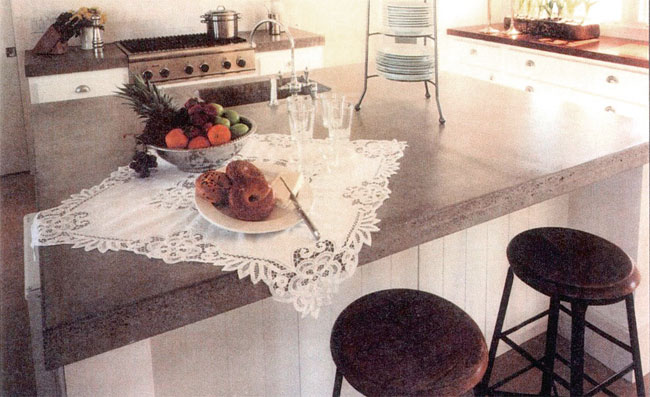How to Seal and Maintain Concrete Counter Tops
Recommended Sealers for Use on Concrete Counters
The following Glaze ‘N Seal sealers are popular choices for use on concrete counters. They will resist water stains, oil stains and enhance appearance. They are durable and re-coatable. Always perform a test patch, allow it to dry thoroughly and “test” likely contaminates.
- A clear coating sealer (solvent base)
- Non-Yellowing
- Will not turn white
- Excellent oil resistance
- Resists acids
- Resists efflorescence (white residue)
- Imparts “wet look” appearance
- Additional coats add gloss
- Safe for food surfaces (after fully curing)
- Re-coatable
- Leaves a coating on top of surface
- A clear coating sealer (water base)
- Leaves a coating on top of surface
- Non-Yellowing
- Resists acids
- Excellent oil resistance
- Safe for food surfaces (after fully curing)
- Re-coatable
- May be applied over Wet Look Lacquer
- Medium to high sheen (based on number of coats)
- A below surface penetrating sealer (water base)
- Leaves no film or coating on top
- Natural look appearance
- Safe for all food surfaces
- Excellent oil resistance
- NOT acid resistant
- May be re-applied if needed
- Not recommended over coating-type sealer
New concrete counters should cure at least seven (7) days or more before sealing. Read package label carefully and perform a small test-patch before sealing entire surface. Concrete surface must be clean, dry and free of any contaminants including old wax and failing sealers. Wax or polish should be stripped with a quality item such as Glaze ‘N Seal Stone Stripper or Heavy Duty Cleaner. Old coating-type sealers (if peeling or damaged) should be removed with a quality item such as Glaze ‘N Seal Paint, Sealer and Coating Stripper.
Estimated coverage per gallon for the first coat – 150 to 200 square feet. Additional coats will add fifty-percent more coverage.
Coating-type sealers will build protection and gloss with multiple, thin and even coats. Use a lambs-wool applicator, brush or paint pad. Apply additional coats until the last coat does not darken the appearance.
Penetrating-type sealers will not add gloss but will protect. Apply two liberal coats with a brush or paint pad. Generally, additional coats will not affect appearance, but may leave a residue if over applied.
Routine Maintenance
Even AFTER sealing, the concrete counters are not indestructible.
Use coasters for glasses and hot pads for hot items. Minor scratches should be removed with non-abrasive “Scotch Brite” pad.
Do not place hot pans and dishes (above 300°) on sealed surface.
Stain resistance to water-based spills, oils, food items, etc., is excellent; however, spills should be removed as soon as possible.
Coating-type sealers will be etch-resistant to acidic items such as colas, citrus juices and wine because of the film barrier. Penetrating sealers do not protect against etching.
Clean the sealed surface regularly with a soft cloth using diluted Glaze ‘N Seal Neutral Cleaner or Stone Cleaner. Rinse with a minimum of water and dry promptly. Soaps and detergents can leave a film on the surface. NEVER use abrasive cleaners, bleach or ammonia.
The use of Glaze ‘N Seal’s Acrylic Floor Polish or a quality paste Carnauba food safe wax is optional as a sacrificial maintenance top coat…. Not a silicone type product.
Reapply polish as needed (remove any old polish or wax first) before reapplying sealer.
Note: Always test a small area of surface to be sealed to verify penetration and satisfaction of sealed appearance.
More information on how to clean Seal and maintenance your hard surface
